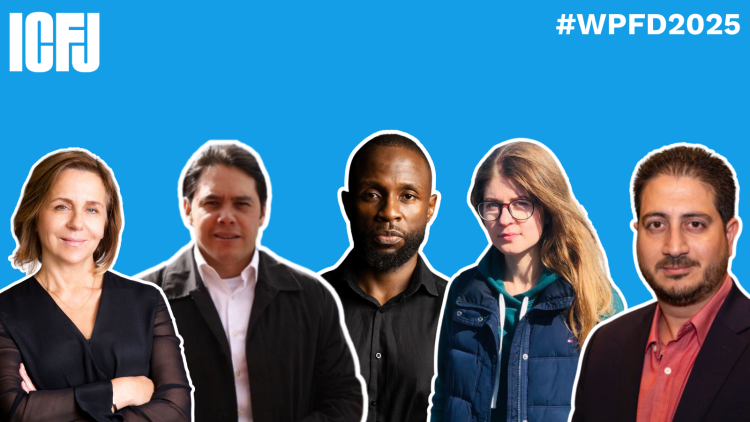Risks to journalists’ safety and their ability to operate are growing every day, from state-sponsored repression and legal attacks to armed conflicts and online violence. “Right now, it feels like a perfect storm has hit independent media,” said Anastasia Rudenko, founder and editor-in-chief of the Ukrainian outlet Rubryka.
Many journalists in ICFJ’s global network are being affected by these troubling trends, including direct threats to them and their families, sophisticated state surveillance and legal intimidation. But despite the risks, they demonstrate remarkable resilience, continuing their vital work informing their communities. “We continue our journalism because we believe it’s essential – not just as a tool for information, but as a way to protect people’s dignity and agency,” said José J. Nieves, editor-in-chief of the Cuban outlet, El Toque.
This World Press Freedom Day, we asked some of the journalists we work with to share what press freedom challenges they’re facing – and what has made it possible to continue their journalism.

José J. Nieves
Editor-in-Chief, El Toque and ICFJ Knight Fellow
Cuba (In Exile)
One of the biggest challenges we’ve faced recently is the expansion and intensification of state-sponsored repression beyond Cuba’s borders. While I have lived in exile since 2019, the threats have not stopped. In fact, they have become more sophisticated and far-reaching, even with direct threats on me and my family.
Over the past two years, the Cuban government has escalated its attacks against El Toque in public and private ways. On the one hand, there is an orchestrated campaign of public discredit [...] which contributes to building a false narrative that aims to criminalize our work. On the other hand, the consequences have spilled over into real-life persecution. People who once collaborated with our newsroom – even those who have not worked with us for over two years – have been summoned, interrogated, threatened, and subjected to psychological torture by state security agents.
What has kept us going is a mix of purpose, adaptability and community. El Toque has become a fully transnational newsroom, built on trust, remote collaboration and resilience. Our readers have also been a vital source of strength. Their feedback, their courage in sharing our work even when it’s risky, and their stories remind us why we do what we do.
Anastasia Rudenko
Founder and Editor-in-Chief, Rubryka
Ukraine
In Ukraine’s war-torn reality, the withdrawal of international funding isn’t just a budget issue – it’s an existential threat. We’re facing the simultaneous collapse of donor support, the advertising model, and an escalating disinformation crisis. Yet the greatest threat to press freedom remains Russia’s deliberate and systemic assault on independent journalism.
For the third year of its full-scale war against Ukraine, Russia has not only targeted our cities and civilians – it has actively targeted the truth. Ninety-seven Ukrainian journalists have been killed, and many more have been abducted, injured, persecuted and threatened. Media offices have been destroyed.
And this is exactly why it’s more important than ever to continue our work – to stay here, in Ukraine, documenting, informing and refusing to let the truth be erased. Most of all, our journalism survives because it’s not just reporting – it’s a form of resistance, of care, and of co-creation with the communities we serve.
Rana Sabbagh
Investigative Editor, Reporter and 2025 ICFJ Knight Trailblazer Award Winner
Jordan
I believe government surveillance of journalists using ever-developing technology is the biggest threat facing journalists.
In the case of MENA, journalists suffer more because it is the worst region in the world for free speech and independent media. Adding to that is the horrific suffering of many of my life-long colleagues in Gaza and their families, or colleagues in Yemen, facing war, and in political turmoil in countries like Syria, Lebanon and Iraq.
It is a job one chooses and sticks to in the service of the public’s right to know to be able to make informed decisions and to hold the powerful to account. Without free media society cannot thrive. This is a very dangerous job and remains a matter of choice.
Carlos Eduardo Huertas
Director, CONNECTAS
Colombia
The campaigns of the powerful attacking the oversight of journalism have helped to significantly erode public trust in journalism. The antidote is to continue producing more and better quality journalism.
What has made it possible to keep going is understanding the importance and urgency of our work for a society that is our ultimate boss, and to whom we fully owe timely and relevant information in the public interest so that people can make better decisions.
John-Allan Namu
Co-Founder and CEO, Africa Uncensored
Kenya
We've struggled with access to information quite a bit – our laws safeguarding journalistic rights are looked at as inconveniences by some public institutions. We're also seeing a sharp rise in SLAPP suits. At the subnational level, it is the bad old tactics of direct threats, blatant blackballing of journalists who aren't compliant with the wishes of the powerful, and bribery.
I believe that the profile I've built over the years has been something that has come to save me and my organization. It is more difficult to target someone with a public profile – but I like to believe that the credibility of our work at Africa Uncensored has spoken for us more than we have for ourselves.